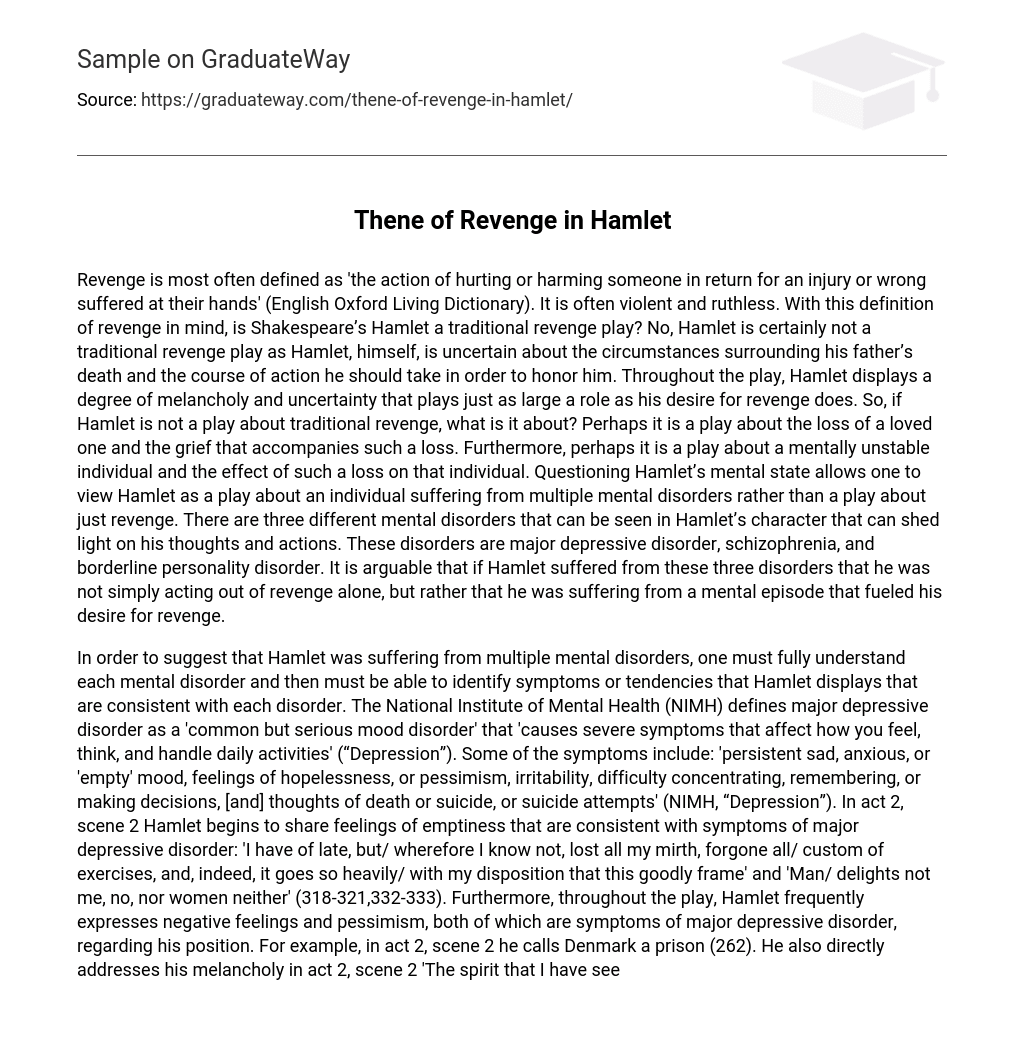Revenge is most often defined as ‘the action of hurting or harming someone in return for an injury or wrong suffered at their hands’ (English Oxford Living Dictionary). It is often violent and ruthless. With this definition of revenge in mind, is Shakespeare’s Hamlet a traditional revenge play? No, Hamlet is certainly not a traditional revenge play as Hamlet, himself, is uncertain about the circumstances surrounding his father’s death and the course of action he should take in order to honor him. Throughout the play, Hamlet displays a degree of melancholy and uncertainty that plays just as large a role as his desire for revenge does. So, if Hamlet is not a play about traditional revenge, what is it about? Perhaps it is a play about the loss of a loved one and the grief that accompanies such a loss. Furthermore, perhaps it is a play about a mentally unstable individual and the effect of such a loss on that individual. Questioning Hamlet’s mental state allows one to view Hamlet as a play about an individual suffering from multiple mental disorders rather than a play about just revenge. There are three different mental disorders that can be seen in Hamlet’s character that can shed light on his thoughts and actions. These disorders are major depressive disorder, schizophrenia, and borderline personality disorder. It is arguable that if Hamlet suffered from these three disorders that he was not simply acting out of revenge alone, but rather that he was suffering from a mental episode that fueled his desire for revenge.
In order to suggest that Hamlet was suffering from multiple mental disorders, one must fully understand each mental disorder and then must be able to identify symptoms or tendencies that Hamlet displays that are consistent with each disorder. The National Institute of Mental Health (NIMH) defines major depressive disorder as a ‘common but serious mood disorder’ that ’causes severe symptoms that affect how you feel, think, and handle daily activities’ (“Depression”). Some of the symptoms include: ‘persistent sad, anxious, or ’empty’ mood, feelings of hopelessness, or pessimism, irritability, difficulty concentrating, remembering, or making decisions, [and] thoughts of death or suicide, or suicide attempts’ (NIMH, “Depression”). In act 2, scene 2 Hamlet begins to share feelings of emptiness that are consistent with symptoms of major depressive disorder: ‘I have of late, but/ wherefore I know not, lost all my mirth, forgone all/ custom of exercises, and, indeed, it goes so heavily/ with my disposition that this goodly frame’ and ‘Man/ delights not me, no, nor women neither’ (318-321,332-333). Furthermore, throughout the play, Hamlet frequently expresses negative feelings and pessimism, both of which are symptoms of major depressive disorder, regarding his position. For example, in act 2, scene 2 he calls Denmark a prison (262). He also directly addresses his melancholy in act 2, scene 2 ‘The spirit that I have seen/ May be a devil, and the devil hath power/ T’ assume a pleasing shape; yea, and perhaps,/ Out of my weakness and my melancholy’ (627-630). And finally, from the very beginning of the play Hamlet debates death and suicide, as evident in his ‘To be, or not to be’ soliloquy (3.1.64). All of these words and actions, as well as many others, strongly suggest that Hamlet may have been suffering from major depressive disorder.
Schizophrenia, on the other hand, is defined by the NIMH as ‘a chronic and severe mental disorder that affects how a person thinks, feels, and behaves. People with schizophrenia may seem like they have lost touch with reality’ (“Schizophrenia”). Three common symptoms of schizophrenia include: ‘hallucinations, delusions, [and] thought disorders (unusual or dysfunctional ways of thinking)’ (NIMH, “Schizophrenia”). In act 1, scene 4, Hamlet begins experiencing what many would call hallucinations. Throughout the play Hamlet claims to have seen and spoke with the ghost of his father. Furthermore, even though others claim to have seen the ghost, Hamlet is the only one capable of speaking to and hearing the Ghost. This is evident in act 3, scene 4 when Hamlet and the Queen are speaking with one another:
QUEEN To whom do you speak this?
HAMLET Do you see nothing there?
QUEEN
Nothing at all; yet all that is I see.
HAMLET Nor did you nothing hear?
QUEEN No, nothing but ourselves. (149-153)
Hamlet also begins displaying thoughts and actions consistent with delusions in act 1, scene 2 when he begins questioning his mother’s willingness to marry his uncle so soon after his father’s death: “She married. O, most wicked speed, to post/ With such dexterity to incestuous sheets!/ It is not, nor it cannot come to good” (161-163). These words, along with several others throughout the play, lead us to believe that Hamlet believes he is the only one who can see what is truly going on between his mother and his uncle. And finally, Hamlet’s unusual and disorganized way of speaking is consistent with a thought disorder that may be present in individuals suffering from schizophrenia. On a number of occasions, we witness Hamlet speak words that appear to make sense to him, but only leave those he is speaking to confused. For example, in act 2, scene 2 when Polonis asks Hamlet what he is reading he receives a very unusual response:
HAMLET Slanders, sir; for the satirical rogue says here
that old men have gray beards, that their faces are
wrinkled, their eyes purging thick amber and
plum-tree gum, and that they have a plentiful lack of
wit, together with most weak hams; all which, sir,
though I most powerfully and potently believe, yet I
hold it not honesty to have it thus set down; for
yourself, sir, shall grow old as I am, if, like a crab,
you could go backward.
POLONIUS, aside Though this be madness, yet there is
method in ’t.—Will you walk out of the air, my lord?





